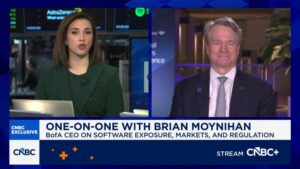The U.S. labor market recovery may be slowing, but Wall Street still thinks it’s time for the Federal Reserve to take a step back from its far-reaching monetary support during the pandemic.
The Federal Reserve probably will — and should — taper “excessive liquidity-accommodation in the very near future,” BlackRock’s Rick Rieder, CIO of global-fixed income at the investment giant, wrote in Friday note, after September’s disappointing payroll report.
September’s nonfarm payroll data on Friday showed the U.S. economy had the smallest gain in jobs of the year, adding a fewer-than-anticipated 194,000 jobs, while the unemployment rate dropped to 4.8% from 5.1%.
Rieder pointed to the “unusual situation” in the U.S., namely that jobs gains have subsided from earlier monthly highs, but that pandemic shortages, including for workers, have fueled surges in prices for everything from household goods to cars, “consequently dulling the growth of an economy.”
Read: California port crisis, tangled supply chains are fueling a shipping container boom. Will it bust?
BlackRock, for some time, has been arguing that the Fed’s “emergency” monetary policies no longer are necessary, given what has been an “impressive” economic recovery.
Here’s a Barclays chart showing why its economists think monthly payroll gains since August 2020 have been sufficient to taper.
Pandemic payrolls
Barclays
“In our view, the FOMC will regard cumulative progress through September as sufficient to warrant a November taper announcement,” Barclays’ economics research team led by Jonathan Millar, wrote Friday, speaking of the the central bank’s policy and rate-setting committee.
Fed Chairman Jerome Powell said “he didn’t need to see a ‘super strong’ report in order for the Fed to proceed with a taper, only a ‘reasonably good’ employment report,” Eric Winograd, AllianceBernstein’s senior economist for fixed income, wrote in a note.
While the slower pace of job growth may “give the Fed some pause,” Winograd thinks there is an 70% chance the central bank will move forward with plans to reduce its $120 billion monthly pace of Treasury and mortgage-backed securities purchases, with the odds of waiting another month at 30%.
The Fed now holds $5.4 trillion of Treasury debt, but also about $2.5 trillion of mortgage-backed securities with government backing.
The dual punch of the Fed’s low interest rate policy and extreme liquidity have spilled over into markets in ways like never before, including as Wall Street firms flush with cash have parked $1 trillion to $1.6 trillion overnight since mid-August at the popular repo facility set up at the New York Federal Reserve Bank.
While many U.S. households have found a better financial footing during the pandemic, the downturn also has been exacerbating inequality in America, particularly for families who don’t own homes or stocks as prices have leapt to fresh all-time highs.
U.S. stocks were struggling for direction Friday to cap a volatile week for equities, but with the Dow Jones Industrial Average
DJIA,
still poised for a roughly 1.4% weekly gain, the S&P 500 index
SPX,
was headed for a near 1% climb since Monday and Nasdaq Composite Index
COMP,
fighting to end the week 0.4% higher.
U.S. credit spreads, or the compensation investors are paid on bonds over a risk-free benchmark rate like Treasurys
TMUBMUSD10Y,
also have compressed to near historic lows as the Fed’s bond purchase program enters its 19th month.
See: ‘A job is not just a job’ —Why some unemployed people aren’t jumping at job openings
This post was originally published on Market Watch






